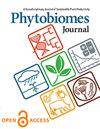Contrasting nitrogen fertilization and Brassica napus (canola) variety development impact recruitment of the root-associated microbiome
IF 3.3
3区 生物学
Q2 MICROBIOLOGY
引用次数: 1
Abstract
Canola (Brassica napus) is an important broadacre crop, produced under high nitrogen (N) fertilizer application. Modern canola varieties are developed under high N rates but the impacts on root-associated microbiomes of different varieties are unknown. We studied eight canola varieties spanning historical Canadian spring canola development at two sites under high and low N fertility and characterized bacterial and fungal microbiomes in the root and rhizosphere using amplicon sequencing. Environmental conditions and the resulting canola varietal responses strongly affected the root-associated bacterial and fungal microbiomes. Microbes regulated by N fertility in each canola variety were mainly Gammaproteobacteria, Bacteroidia, Actinobacteria, Sordariomycetes, Dothideomycetes, and Agaricomycetes classes. Differentially abundant (DA) microbial taxa showed that N more strongly enriched bacteria in the roots and fungi in the rhizosphere. Each variety had its specific pattern of DA-ASVs responding to soil N availability, and the profile of DA-ASVs in paired canola varieties were also altered by soil N availability, especially bacteria in rhizosphere. The yield was strongly associated with a subset of microbial taxa mainly from Proteobacteria, Actinobacteriota, and Ascomycota. These variety-dependent responses to N and links to yield performance make root-associated microbiome a promising target for improving the agronomic performance of canola by manipulating microorganisms tailored to soil fertility and plant genotype.对比施氮量和油菜品种发育对根相关微生物群招募的影响
油菜(Brassica napus)是一种重要的大面积作物,在高氮条件下生产。现代油菜品种是在高氮条件下发展起来的,但对不同品种根系相关微生物群的影响尚不清楚。我们研究了八个油菜品种,这些品种跨越了加拿大春季油菜在高氮和低氮肥力两个地点的历史发展,并使用扩增子测序对根和根际的细菌和真菌微生物群进行了表征。环境条件和由此产生的油菜品种反应强烈影响了与根相关的细菌和真菌微生物群。在每个油菜品种中,受N肥力调节的微生物主要是γ-变形菌、拟杆菌、放线菌、Sordariomycetes、Dothideomyctes和琼脂纲。不同丰度(DA)的微生物类群表明,N更强烈地富集了根中的细菌和根际的真菌。每个品种都有其对土壤氮有效性的特定DA-ASV模式,配对油菜品种的DA-ASV图谱也受到土壤氮有效度的影响,尤其是根际细菌的影响。产量与主要来自变形菌门、放线菌门和子囊菌门的微生物类群的子集密切相关。这些对氮的品种依赖性反应以及与产量表现的联系使根相关微生物组成为一个有希望的目标,通过操纵根据土壤肥力和植物基因型定制的微生物来提高油菜的农艺性能。
本文章由计算机程序翻译,如有差异,请以英文原文为准。
求助全文
约1分钟内获得全文
求助全文

 求助内容:
求助内容: 应助结果提醒方式:
应助结果提醒方式:


